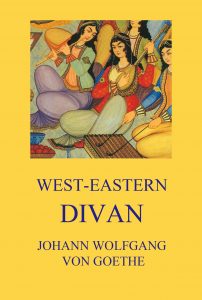West-Eastern Divan – Johann Wolfgang von Goethe
This volume stands for the huge task of Dowden’s middle life-the translation of Goethe’s ‘West-Eastern Divan.’ This is a poem, as Mrs. Dowden observes in the foreword, that is known to few English readers. It is the fruit of Goethe’s Indian Summer, the last word of his cheerful and composed philosophy of life. It was written between 1814 and 1819 and was inspired not only by Goethe’s correspondence with Marianne von Willemer, but also by the von Hammer’s translation of Hafez’ poems. Speaking of translations, Mr. Dowden’s translation is overwhelmingly good. No man is so hard to translate as Goethe, and certainly no English writer has succeeded with him better – if as well – than Prof. Dowden. The best test is that many of the lines seem as inevitable as they do in the original; for instance, “that haunting felicity, always. Impossible doth seem the rose, and Inconceivable the nightingale.” On the whole, the contemplation of Prof. Dowden’s work leaves a certain sadness in the mind of the reader. Dowden always wanted to dedicate himself to poetry, but the necessities of life Intervened, as they so often do, and he had to choose another master. He says in a letter, “One of my afflictions is a theory that I could do my best work in verse, and the circumstance that every year my lectures lead me to accumulating a quantity of material that is pleasant property for my outer mind, but is positive injury to the soul within the soul.”
Format: eBook.
West-Eastern Divan.
ISBN: 9783849658700
Excerpt from the text:
XV. HALE AND HARDY
SONG is a certain arrogance,
Let none find fault with me!
But bravely let the warm blood dance
Be gay as I and free.
If bitter every hour’s distress
Upon my palate grew,
I should be modest, and no less
Nay, rather more than you.
For modesty charms everyone
In budding maidenhood;
Girls would be gently wooed and won
And fly before the rude.
And with a wise man modesty
Befits – some sage who might
Of time and of eternity
Teach me the lore aright.
Song is a certain arrogance!
I ply my craft alone;
Friends, women, of the dancing blood
Come in, come every one!
You cowl-less shaveling! zealous breath
Waste not on me! Your flow
Of speech might do my soul to death,
But make me modest – No!
Your vacuous phrases make me run;
Such stuff since many a day,
Shoe-leather that I trod upon,
For me was worn away.
When round the poet’s mill-wheel turns,
Stop not his whirl of rhymes;
For who once understands us learns
To pardon us betimes.
XVI. UNIVERSAL LIFE
DUST is an element from which
Your art a use can wring,
Hafiz, when to extol your Love
Some dainty song you sing.
For more to be preferred is dust
That on her threshold lights,
Than carpet on whose gold-wrought flowers
Kneel Mahmud’s favourites.
If from her door whirl clouds of dust,
Driven by some wind that blows,
Sweeter it breathes to you than musk,
Or attar of the rose.
Dust! long I was deprived of it
In the mist-shrouded North,
But in the glowing South for me
There surely was no dearth.
Loved doors, upon your hinges long
Sounded no sweet recoil!
Come, heal me, ye tempestuous rains,
And scent of breathing soil!
For now if all the thunders roll,
Wide heaven with leven glow,
The wind’s wild dust, rain-saturate,
Will fall to earth below.
Straightway life leaps; a sacred force
And secret strives in birth;
Fresh mists exhale, green things arise,
O’er all the bounds of earth.
….

